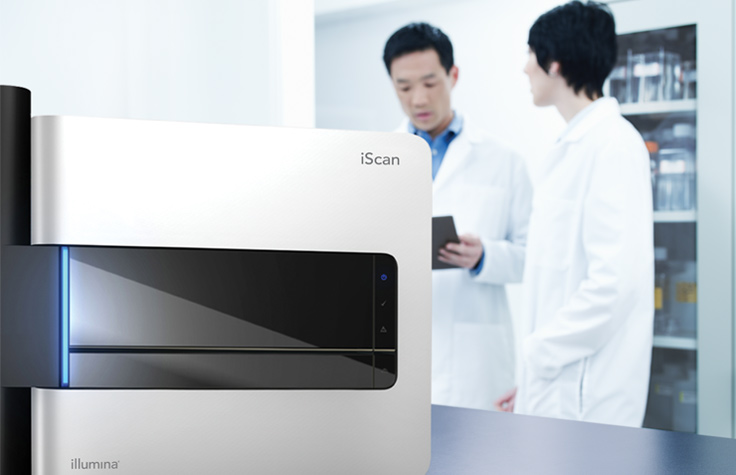Methylation Array Analysis
Introduction to Methylation Array Analysis
Methylation arrays enable quantitative interrogation of selected methylation sites across the genome, offering high-throughput capabilities that minimize the cost per sample. Array-based methylation studies can provide valuable insights into the regulation of gene expression. DNA methylation allows cells to suppress expression of viral and nonhost DNA elements, and facilitates response to environmental stimuli. Aberrant DNA methylation (hyper- or hypomethylation) and its impact on gene expression have been implicated in many biological processes and diseases.
Advantages of Methylation Arrays
Methylation microarrays combine comprehensive coverage and high-throughput capabilities. Advantages include:
- Comprehensive genome-wide coverage of content categories requested by methylation experts such as:
- CpG islands
- Non-CpG and differentially methylated sites
- Enhancers
- Open chromatin
- Transcription factor binding sites
- miRNA promoter regions
- Assay reproducibility
- > 98% reproducibility between technical replicates for all Illumina Infinium methylation arrays
- User-friendly, streamlined workflow and simple analysis
- Many methylation arrays are validated for use with FFPE samples
Illumina Methylation Arrays
The Infinium Methylation Assay allows you to interrogate CpG sites at single-nucleotide resolution, providing highly robust measurements of DNA methylation. Choose from one of our curated genome-wide arrays, or design your own microarray for targeted applications.
MethylationEPIC v2.0
The Infinium MethylationEPIC v2.0 BeadChip is a genome-wide methylation analysis tool with enhanced, expert-selected functional content. It is ideal for genetic and rare disease research, cancer research, and classification.
Infinium Methylation Screening Array
The Infinium Methylation Screening Array is a cost-effective, scalable solution for population health studies, ideal for biobank screening and epigenome-wide association studies, with ~270K methylation sites and automation for large cohorts.
Mouse Methylation BeadChip
The Infinium Mouse Methylation BeadChip delivers high-resolution, genome-wide DNA methylation analysis across murine strains, covering 285K sites at single-nucleotide resolution. Ideal for EWAS, xenograft studies, and preclinical research, it offers comprehensive coverage and reproducibility with a PCR-free workflow.
HTS iSelect Methyl Custom BeadChip
The Infinium Custom Methylation Kit offers flexible, made-to-order arrays for targeted epigenetic research, supporting 3K–100K markers and high-throughput processing. Ideal for specialized projects, it combines robust Infinium chemistry with automation-ready workflows for accurate, scalable methylation analysis.
Custom EX Methyl Beadchip
These BeadChips are an ideal solution for customers who need to perform large-scale research screening of user-defined methylation sites in human or select nonhuman samples.

DNA methylation for human disease research
This eBook introduces DNA methylation and its applications for the study of human diseases and other phenotypes. It will also cover epigenome-wide association studies, including considerations for study design, sample types, and data analysis.
Download eBookMethylation Array Workflow
Our methylation arrays follow a streamlined workflow, enabling processing of up to 96 samples simultaneously from low sample input (as little as 250 ng).
Offering quantitative measurement at the single-CpG-site level, these methylation microarrays offer powerful resolution for understanding epigenetic changes.
Click on the below to view products for each workflow step.
Robust methylation profiling microarray with extensive coverage of CpG islands, genes, and enhancers and FFPE compatibility.
Ultra-scalable methylation array optimized for population health research. Ideal for studies >1,000 samples, up to millions of samples.
Features > 285k markers across the methylome for high resolution epigenetic analyses of diverse murine strains.
Create made-to-order, high-throughput assays to fit your specific needs. The flexibility and features of this array make it a powerful tool for a wide range of epigenetic applications.
Supports high-throughput BeadChip processing, scanning hundreds to thousands of samples quickly and accurately.
Illumina genotyping automation options for Infinium, GoldenGate, and DASL Assays streamline workflow and reduce errors. Illumina robot control software, together with liquid-handling automation, enables seamless automation of sample preparation into the iScan System workflow.
Cloud-based high-throughput and quantitative reporting for Infinium methylation microarrays.
Visualize Infinium controls to ensure quality processing and perform basic analysis on DNA methylation beadchip data.
Featured Webinars
Exploring the Genetics of Neuropsychiatric Disease

Dr. Kristen Brennand discusses how integrating methylation array data with DNA and RNA sequencing data from stem cells can help identify disease-associated genes and pathways.
View WebinarDNA Methylation Classifiers for Brain Tumors and Sarcomas

Dr. Matija Snuderl discusses his team's research into the use of machine learning and epigenetic signatures to improve the accuracy of solid tumor classifications, especially for brain tumors and sarcomas.
View WebinarScientists Discuss Methylation Array Research
Methylome and Clinical Outcomes
Dr. Kathleen C. Barnes describes her work as a genetic epidemiologist, how COVID-19 impacted her research plans, and how methylation arrays add another dimension to the study of infectious diseases.
Read InterviewThe Genetic Basis of Oral Cancer
Researchers use methylation arrays together with RNA-Seq and other next-generation sequencing methods to identify genetic alterations associated with a deadly oral cancer.
Read InterviewEpigenetics Studies Uncover Obesity-Driven Methylation Signatures
Dr. Samani at University of Leicester uses methylation arrays to identify cell signaling disruption linked with high BMI.
Read InterviewRelated Solutions
Complex Disease Studies
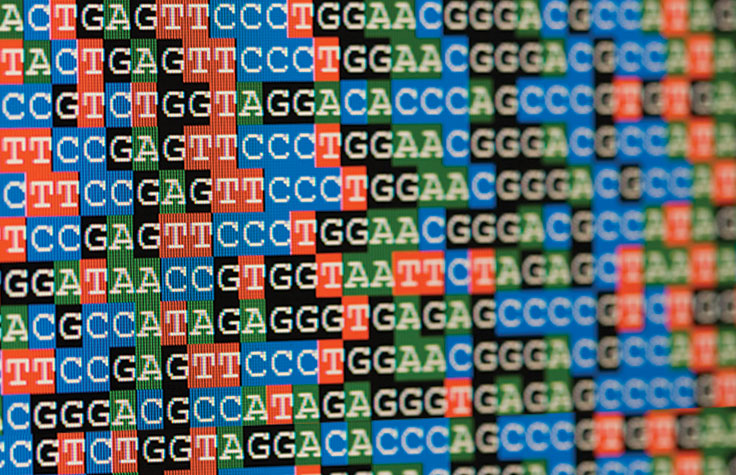
Methylation array studies enable researchers to understand the functional mechanisms at work in complex disease. Illumina offers complementary solutions for researchers studying these disorders. Learn more about complex disease research.
Epigenetics and Cancer

Illumina array and sequencing solutions are ideal for detecting altered methylation patterns and epigenetic changes that provide insight into tumorigenic pathways and cancer progression. Learn more about cancer epigenetics.
Publications
DNA methylation-based classification of central nervous system tumours.
Nature 555 469-74 2018
Clinical epigenomics: genome-wide DNA methylation analysis for the diagnosis of Mendelian disorders.
Genetics in Medicine 23 1065-74 2021
Host methylation predicts SARS-CoV-2 infection and clinical outcome.
Commun Med 1(1):42 124-29 2021
Interested in receiving newsletters, case studies, and information on genomic analysis techniques? Enter your email address.
Additional Resources
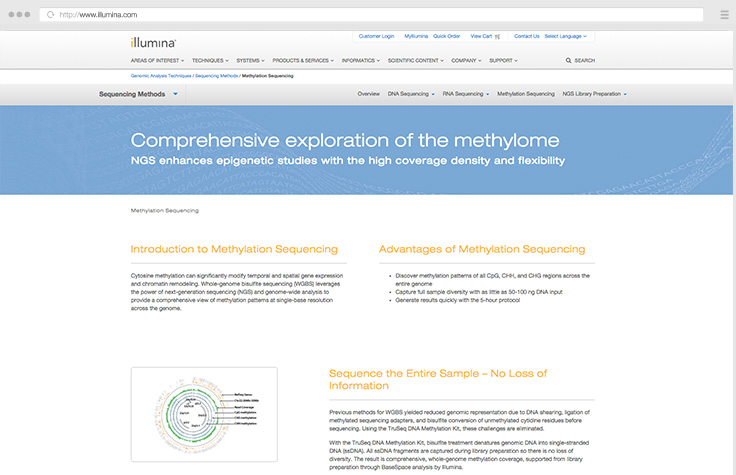
Methylation Sequencing
Methylation sequencing approaches offer higher density and flexibility in assessing epigenome changes.
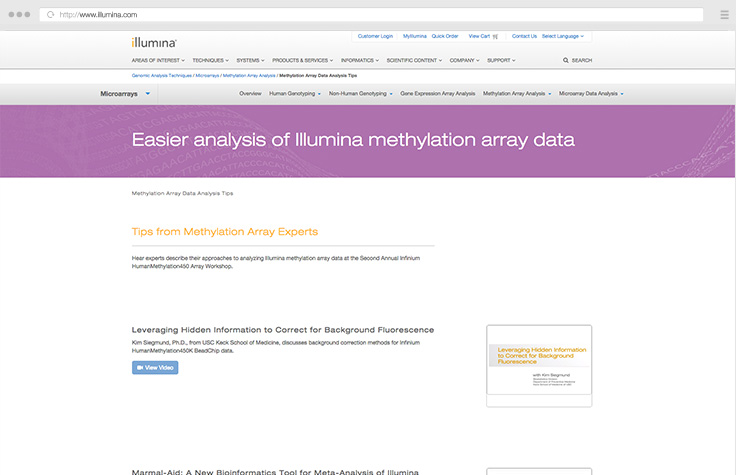
Methylation Array Data Analysis Tips
Explore advanced approaches for analyzing Illumina methylation array data.
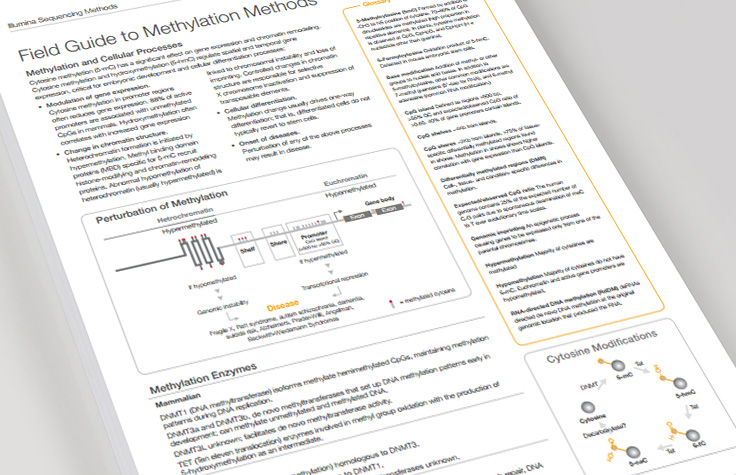
Methylation Field Guide
Explore a variety of methods used to detect cytosine modifications, including methylation arrays and sequencing approaches.

